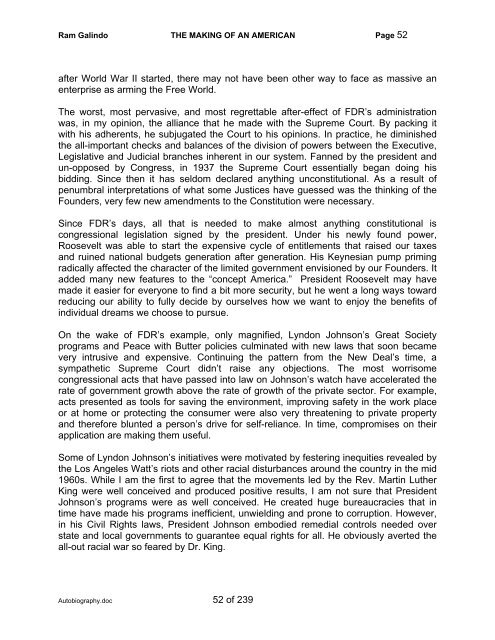Autobiography - The Galindo Group
Autobiography - The Galindo Group
Autobiography - The Galindo Group
Create successful ePaper yourself
Turn your PDF publications into a flip-book with our unique Google optimized e-Paper software.
Ram <strong>Galindo</strong> THE MAKING OF AN AMERICAN Page 52<br />
after World War II started, there may not have been other way to face as massive an<br />
enterprise as arming the Free World.<br />
<strong>The</strong> worst, most pervasive, and most regrettable after-effect of FDR’s administration<br />
was, in my opinion, the alliance that he made with the Supreme Court. By packing it<br />
with his adherents, he subjugated the Court to his opinions. In practice, he diminished<br />
the all-important checks and balances of the division of powers between the Executive,<br />
Legislative and Judicial branches inherent in our system. Fanned by the president and<br />
un-opposed by Congress, in 1937 the Supreme Court essentially began doing his<br />
bidding. Since then it has seldom declared anything unconstitutional. As a result of<br />
penumbral interpretations of what some Justices have guessed was the thinking of the<br />
Founders, very few new amendments to the Constitution were necessary.<br />
Since FDR’s days, all that is needed to make almost anything constitutional is<br />
congressional legislation signed by the president. Under his newly found power,<br />
Roosevelt was able to start the expensive cycle of entitlements that raised our taxes<br />
and ruined national budgets generation after generation. His Keynesian pump priming<br />
radically affected the character of the limited government envisioned by our Founders. It<br />
added many new features to the “concept America.” President Roosevelt may have<br />
made it easier for everyone to find a bit more security, but he went a long ways toward<br />
reducing our ability to fully decide by ourselves how we want to enjoy the benefits of<br />
individual dreams we choose to pursue.<br />
On the wake of FDR’s example, only magnified, Lyndon Johnson’s Great Society<br />
programs and Peace with Butter policies culminated with new laws that soon became<br />
very intrusive and expensive. Continuing the pattern from the New Deal’s time, a<br />
sympathetic Supreme Court didn’t raise any objections. <strong>The</strong> most worrisome<br />
congressional acts that have passed into law on Johnson’s watch have accelerated the<br />
rate of government growth above the rate of growth of the private sector. For example,<br />
acts presented as tools for saving the environment, improving safety in the work place<br />
or at home or protecting the consumer were also very threatening to private property<br />
and therefore blunted a person’s drive for self-reliance. In time, compromises on their<br />
application are making them useful.<br />
Some of Lyndon Johnson’s initiatives were motivated by festering inequities revealed by<br />
the Los Angeles Watt’s riots and other racial disturbances around the country in the mid<br />
1960s. While I am the first to agree that the movements led by the Rev. Martin Luther<br />
King were well conceived and produced positive results, I am not sure that President<br />
Johnson’s programs were as well conceived. He created huge bureaucracies that in<br />
time have made his programs inefficient, unwielding and prone to corruption. However,<br />
in his Civil Rights laws, President Johnson embodied remedial controls needed over<br />
state and local governments to guarantee equal rights for all. He obviously averted the<br />
all-out racial war so feared by Dr. King.<br />
<strong>Autobiography</strong>.doc 52 of 239


